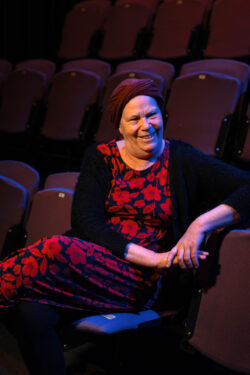Theatre education in Kenya: Exposing female exploitation and supporting women's resistance in the creative arts
- Tags
- Case Study
Using Impact Acceleration Account (IAA) funding, Professor Jane Plastow was able to prove the value of theatre education for Kenyan communities as a way to share complex social and cultural information – uncovering some unexpected, exploitative outcomes.
Professor of African Theatre Jane Plastow began working in Kenya in 2018, using theatre to address a range of social issues – most notably those surrounding maternity care and the low acceptance of contraception. ‘There were a number of non-governmental organisations (NGOs) already working in the area, some using local, semi-professional theatre groups to publicise their work,’ explains Jane.
‘However, there were two big issues. Firstly, the NGOs concerned didn’t have an arts background, so they didn’t realise the potential of theatre. Secondly, the theatre groups had very little money coming in, and their policy was to use the cheapest performers they could find. The quality of their work was poor, so information wasn’t being shared in the best way. I wanted to support them with theatre training to change the way they approached their work.’
Consulting organisations to prove funding need
In Kenya, Jane spent time working alongside fellow University of Leeds Professor Shane Doyle, then received some Arts and Humanities Research Council grants for her independent work. Through this, Jane began to learn about existing problems with NGOs and the sexual exploitation of women, so decided to apply for IAA funding to further this. ‘I’d spoken with a few NGOs and identified people keen to engage with me,’ she says. ‘Then, I applied for IAA funding to provide proof of the value of my cross-disciplinary work. I wanted to see if we could offer good arts training for local NGO leaders and arts groups – increasing both the value of the groups’ and the NGOs’ understanding of theatre methods.’
After securing IAA funds, Jane focussed her resources on engaging with NGOs. ‘We found four NGOs willing to take part in our training programmes, all operating at different levels: pan-African, national Kenyan, and two smaller NGOs working in the areas of health, gender and female empowerment. They all committed to sending senior level staff for the week’s training. This was tough to secure but vital, as junior level staff are less likely to influence the changes that needed to happen.’
Engaging local groups in theatre training
Once the funding was secured and the training booked, three of the four initially committed NGOs took part in the training. ‘Most training in African countries is theoretical and paper-based,’ Jane explains. ‘Instead, I wanted to show these groups training could be fun and energetic as well as practical.’
‘We took the NGOs through a series of exercises and discussions about why the model they were using wasn’t helpful. I introduced them to a theatre group I’d already trained, so they could see examples of shows that were engaging, full of activities and free from lectures. They’re intelligent people, so they recognised how working this way would really benefit the audiences they were trying to reach – especially the young people. This learning led to a second week’s training with younger people from some of the city’s semi-professional theatre groups, who were really receptive to a playful, engaging way to share information.’
Unexpected sexual exploitation discovery resulting from research
One of the most interesting – and indeed troubling – things I uncovered as a by-product of my research was that many of the women involved in these theatre groups were being exploited,’ Jane says. ‘They often provided sex or gave their wages away in exchange for a part. This wasn’t what I was intending to expose, but naturally needed to do something about.
Jane held a regional meeting for women in the arts affected by exploitation. More than 40 women turned up. ‘The women chose to set up their own association, and I’ve since supported them to develop it,’ she adds. ‘I’m trying to urge the NGOs not to work with companies we’ve identified as mistreating women. It was a culturally sensitive diversion from my plans, but it was vital. Without the IAA funding, I wouldn’t have been present to speak with these women in person – and these issues would probably never have come to light.’
Developing policies with further funding
In the spring of 2024, Jane plans to return to Kenya to see if the NGOs are keen to do further training. If it’s proven they do, she plans to apply for more funding. ‘IAA funding meant I can demonstrate there’s an appetite for a better way to approach theatre as a source of social information,’ Jane concludes. ‘The right training creates transferable skills for both theatre groups and NGOS. Yet in order for the groups to do this independently, we need to do another piece of work together beyond this pilot scheme.’
‘There’s more to imbed: further training, then showing the groups how to implement what they’ve learned without external support. I received a small faculty award to help us support the exploited women through outreach workshops and I’m actively looking for further funding opportunities.
Thanks to the IAA funding, we’ve shown what we can do in a relatively short space of time. We’ve had the chance to equip people with additional skills, show them the value of a different approach, and start to make changes to address sensitive, cultural issues disproportionately affecting women in Kenya.’

The IAA supports a portfolio of activities and resources across the social science community which will maximise the potential for impact of social science research and contribute to economic and societal development regionally, nationally, and internationally. To find out more about LSSI IAA funding please visit our dedicated webpage.
